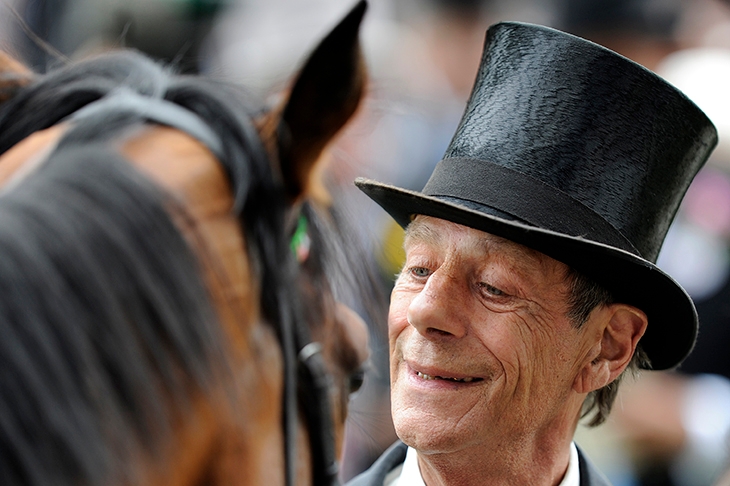There are people I know who regard racing as a cold-hearted business that exploits animals and achieves little besides putting money into bookmakers’ pockets. Sadly for them they will never ever see the passion, subtlety or teamwork that goes into persuading fragile, sensitive or complicated horses to produce their best; the almost parental pride that trainers can’t help but show when an objective is achieved by one of the specially talented ones in their care.
We witnessed it in the winning enclosure a few times this past winter when Warren Greatrex’s zestful, bold-jumping mare La Bague Au Roi was winning her races. And it was obvious, too, at Kempton on Saturday when Agrotera, owned by breeder Bjorn Nielsen, won the Listed Snowdrop Fillies’ Stakes in the silk-smooth hands of the veteran jockey Gerald Mosse. In a thinly populated winners’ enclosure I was intrigued to hear Gerald tell trainer Ed Walker approvingly in his debriefing: ‘She was controllable in the mind.’ As chuffed as a parent whose child has just collected the victor ludorum in the school sports day, her trainer explained that the fine big Mastercraftsman filly had been physically and mentally knocked back by the effort involved in her Royal Ascot success last year and had never shown the same form afterwards. ‘It’s so nice to get her back,’ he explained. ‘She’s very well bred and she’s got a huge engine but she really is difficult to train. For her to come here and behave like that is massive, a real credit to all the guys at home.’
To get Agrotera relaxed enough to show her best on the track she had popped briefly into the parade ring at Kempton, then headed off early to the start with her equine companion Dannios, the now 13-year-old ‘pony’ who had himself won five races for Ed at the start of his career. They’d had to get special permission from the Kempton stewards for the babysitting pony and Dannios had had to undergo all appropriate racehorse inoculations to be allowed in the racecourse yard. Said the bubbling trainer, the emotion evident in his voice: ‘Fair play to the stewards here for allowing us into the paddock. If they do the same at Royal Ascot, I’d love to take her to the Group 2 Duchess of Cambridge Stakes.’ Over to the Ascot authorities. I’m sure the Queen — and the Duchess of Cambridge — would consider that a small price to pay to see a quality filly like Agrotera in action.
The complications of a trainer’s life are vividly depicted in The Triumph of Henry Cecil (Constable, £20), a biography of the ten times champion trainer’s latter years, especially his handling of the superstar Frankel, by stable insider Tony Rushmer. You won’t find a better chronicle of the ins and outs of the training life — the contribution of an intelligent farrier, the change of tactics after listening to a work-rider’s experience, the willingness to accede to Frankel’s choice of box when he fretted on being re-housed — but this is also the story of Cecil’s brave renaissance once his third wife Jane McKeown had given him stability in spite of the cancer he then had to battle. Once inclined to take days in bed with man flu, when faced with the travails of chemotherapy Cecil seemingly proved to be of mental granite. Once careless of others’ feelings, as he emerged from the bad years he discovered humility, bothering on the day of his biggest comeback success in the Oaks to find time to console a lad whose horse had performed poorly in the same race.
As John Gosden writes in his penetrating foreword, Cecil’s talent was completely instinctive: ‘His training style wasn’t technical, it was entirely feel. It was rather like a great concert pianist, something that can’t be taught. It’s intuitive. He had that incredible beyond sixth sense. He couldn’t explain why he was going to do it but he simply felt it and saw it.’ But to produce that extra sense Cecil required the peace of mind and stability that he lost in the wilderness period when drinking, broken marriages and his twin brother’s death devastated his stable numbers and reduced him to just a dozen wins one year.
Tony Rushmer reveals appropriately that the Warren Place horses had a reputation for being well-mannered: ‘They were taught to do things gradually and gently,’ and Cecil’s advice to his work-riders was: ‘Go with them, do not try and make them go with you.’ But he knew, too, when to be firm, making it clear to the once-headstrong Frankel that he was not going to be allowed to train himself.
The author paints an endearing picture of the master trainer, as the lads took the horses out on a summer’s afternoon for a pick of grass, coming and lying among their hooves for a quiet cigarette completely oblivious of the risk of being trampled by a spooked one. Those who ‘just don’t get’ racing might like to note that Henry Cecil told John Gosden that horses were his best friends.






Comments